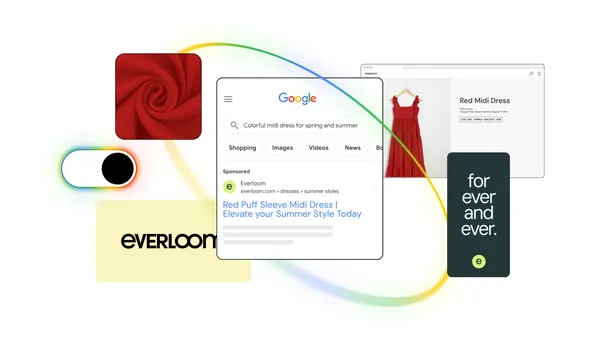South Carolina, it’s time to connect!
Source: Google Fiber Blog
Build rich, interactive web apps with an updated Gemini 2.5 Pro
 Our updated version of Gemini 2.5 Pro has improved capabilities for coding.
Our updated version of Gemini 2.5 Pro has improved capabilities for coding.
Source: The Official Google Blog
Google Ads AI Max for Search campaigns Open Beta
While full AI Max for Search campaigns support in the Google Ads API is planned for v21 in August 2025, we want to ensure you're prepared for the open beta rollout and understand its potential impact on your API interactions.
What is AI Max for Search campaigns?
What is Changing?
During the open beta period, before full API support arrives in v21, there will be a transitional phase. Here's what API users need to know:
- Feature Grouping in the UI: When a user enables AI Max for Search campaigns for a campaign in the Google Ads UI, several legacy features will be grouped into the new AI Max for Search campaigns settings:
- Text customization (formerly known as Automatically created assets (ACA))
- Campaign-level broad match (the setting itself)
- Brand inclusions (previously tied to campaign-level broad match)
- Campaign-level brand exclusions
- Potential API Conflicts During Transition: Once AI Max for Search campaigns has been enabled and then disabled for a campaign via the UI, managing its associated features (ACA, brand list inclusions/exclusions) using any API version is subject to feature grouping and may cause errors. Starting with v21, AI Max for Search campaigns can be activated through the API.
- Why? Disabling AI Max for Search campaigns in the UI during this interim period doesn't fully revert the underlying settings configuration back to the pre-AI Max for Search campaigns state compatible with older API versions for these specific features.
- Campaign-Level Broad Match: Attempts to toggle the campaign-level broad match setting via the API will be allowed but may function differently depending on the AI Max for Search campaigns state. Keywords will still be converted to Broad Match if the setting is enabled via the API, but the primary control mechanism moves to AI Max for Search campaign.
- Text customization: Attempts to deactivate text customization via API requests will raise an error if Final URL expansion is enabled in the UI.
- Mitigation - UI Warnings: To prevent accidental disruption, the Google Ads UI will display warning messages when enabling or disabling AI Max in Search campaigns for campaigns that use these legacy features, explicitly mentioning the potential impact on API workflows during this beta period.
- Recommendation: We strongly advise coordinating within your teams. If your organization relies heavily on API workflows for managing ACA or Brand Lists, be cautious about enabling and then disabling AI Max in Search campaigns in the UI for those campaigns until full API support lands in v21 in August 2025.
- You can continue to manage existing Search campaigns using ACA, campaign-level broad match, and brand exclusions via the current API version (v19) as long as AI Max in Search Campaigns has not been enabled and then disabled for those specific campaigns in the UI.
- Ad Group level Brand Inclusions and Locations of Interest (LOI) pilots (outside of AI Max for Search campaigns) are ending. Functionality for these will only be available within AI Max for Search campaigns going forward.
- Full Support Coming: API v21 (planned for August 2025) will introduce dedicated fields and services to fully manage all AI Max for Search campaigns features, including the new consolidated controls.
- Legacy Field Deprecation: Following the launch and adoption of v21, older API versions will sunset. At that point, the legacy fields for ACA, campaign-level broad match, and standalone brand exclusions/inclusions will be fully deprecated and removed from the API.
Source: Google Ads Developer Blog
Unlock next-level performance with AI Max for Search campaigns
 Introducing AI Max for Search campaigns, bringing the latest and best of Google AI to help you boost performance.
Introducing AI Max for Search campaigns, bringing the latest and best of Google AI to help you boost performance.
Source: The Official Google Blog
Our remedies proposal in the DOJ ad tech case
 The recent court ruling in the DOJ’s ad tech lawsuit found our advertiser tools and acquisitions don’t harm competition. We disagree with the Court’s ruling on our publi…
The recent court ruling in the DOJ’s ad tech lawsuit found our advertiser tools and acquisitions don’t harm competition. We disagree with the Court’s ruling on our publi…
Source: The Official Google Blog
We’re extending the lifespan of the first offshore wind farm in the Netherlands.
 Google’s newest power purchase agreement (PPA) with Shell is the first time a corporate PPA has extended the lifespan of an offshore wind farm1. This agreement will exte…
Google’s newest power purchase agreement (PPA) with Shell is the first time a corporate PPA has extended the lifespan of an offshore wind farm1. This agreement will exte…
Source: The Official Google Blog
Update to the 2025 Google Ads API release schedule
We previously announced our 2025 Google Ads API release plans. We are introducing a few changes to this schedule as a part of our ongoing efforts to evolve our release process. The new schedule lets us make various product features available earlier in the Google Ads API. As usual, additional details on new features will follow as part of the release notes for individual versions.
- V20_1 will be upgraded to a major version and named V21.
- V21 will be renamed to V22.
- We will add two minor releases (v19_2, v20_1) alongside V21 to add these features in existing Google Ads API versions.
- The projected launch dates will remain unchanged.
Here’s our updated schedule.
| Version | Planned Release
Type |
Projected launch | Projected sunset |
|---|---|---|---|
| V20 | Major | June/July 2025 | June 2026 |
| V21 | Major | August/September 2025 | August 2026 |
| v19_2 | Minor | August/September 2025 | February 2026 |
| v20_1 | Minor | August/September 2025 | June 2026 |
| V22 | Major | October/November 2025 | October 2026 |
Please take a look at your future plans to make sure they still align with the upcoming Google Ads API release schedule.
How to get help
If you have any questions or need help, check out the Google Ads API support page for options.
Source: Google Ads Developer Blog
Pre-configure Gemini app conversation history admin settings before they take effect
What’s changing
Starting today, Workspace admins can pre-configure the new Gemini conversation history admin settings before they take effect for their Gemini app users (expected by the end of May 2025). By default, “Gemini conversation history” will be ON and ”Conversation retention” will be set to 18 months (inline with current behavior).
Who’s impacted
Admins and end users
Additional details
- If "Gemini conversation history" is OFF, chats are saved in user accounts for up to 72 hours. This lets Google provide the service and process any feedback. This chat activity won’t appear in a user’s Gemini Apps Activity.
- Regardless of whether the Gemini app history is on or off, content in chats adheres to enterprise privacy and security protections as described in the Google Workspace Terms of Service. You can also learn more in the Privacy Hub.
- If you turn the setting from ON to OFF, existing user conversation history from before the setting is turned OFF is stored for the length of time specified by the "Conversation retention" setting.
- This update will not impact your current Gemini app service setting.
- This update will not impact Gemini in Workspace apps (e.g., Gemini in Gmail).
Getting started
- Admins:
- Review and update the "Gemini conversation history" settings before we enforce these settings (expected by the end of May 2025). Visit the Help Center to learn more about configuring Gemini app conversation history settings for your users.
- If no changes are made, the default settings will apply: “Gemini conversation history” set to ON and "Conversation retention” set to 18 months. Activity older than 18 months will be automatically deleted.
- End Users:
- Users cannot override the Gemini conversation history settings configured by their admin.
- These admin settings will override any individual user changes previously made to their Gemini Apps Activity settings (gemini.google.com or Gemini mobile app).
Rollout pace
- Rapid Release and Scheduled Release domains: Full rollout (1–3 days for feature visibility) starting on May 5, 2025
Availability
- Available for all Google Workspace users with access to the Gemini app.
Resources
Source: Google Workspace Updates
Dev Channel Update for ChromeOS / ChromeOS Flex
The Dev channel is being updated to OS version 16261.0.0 (Browser version 137.0.7137.0) for most ChromeOS devices.
- File a bug
Visit our ChromeOS communities
General: Chromebook Help Community
Beta Specific: ChromeOS Beta Help Community
Interested in switching channels? Find out how.
Luis Menezes
Google ChromeOS


.png)